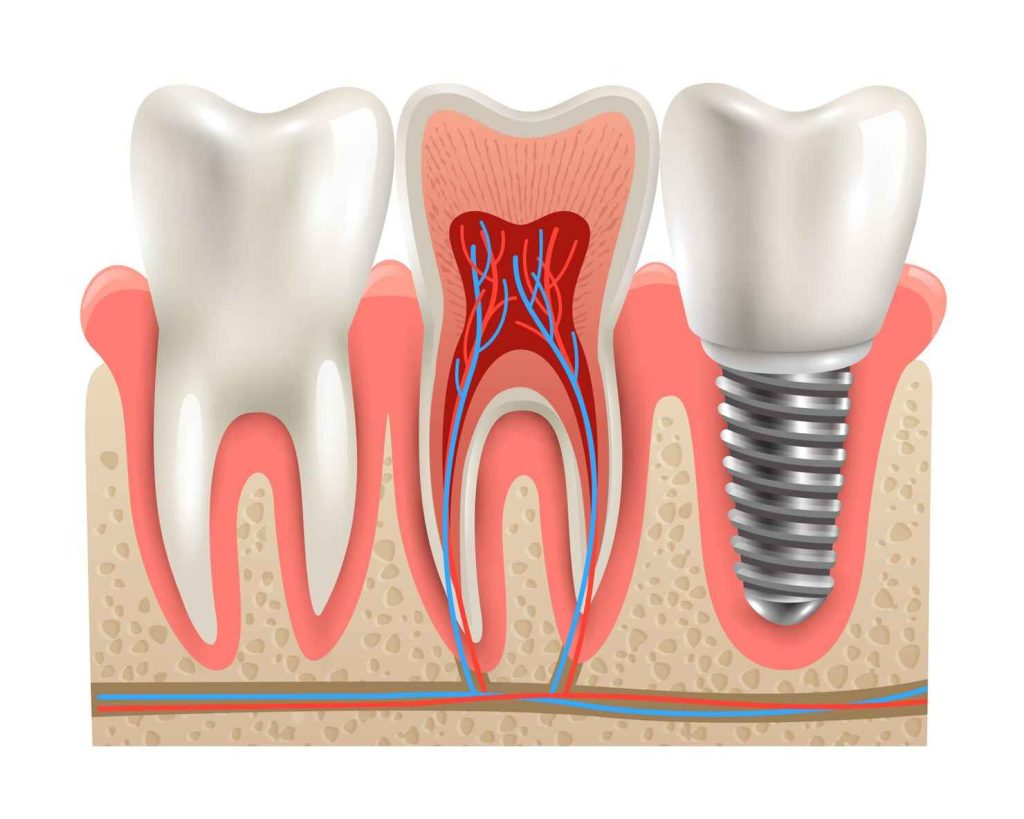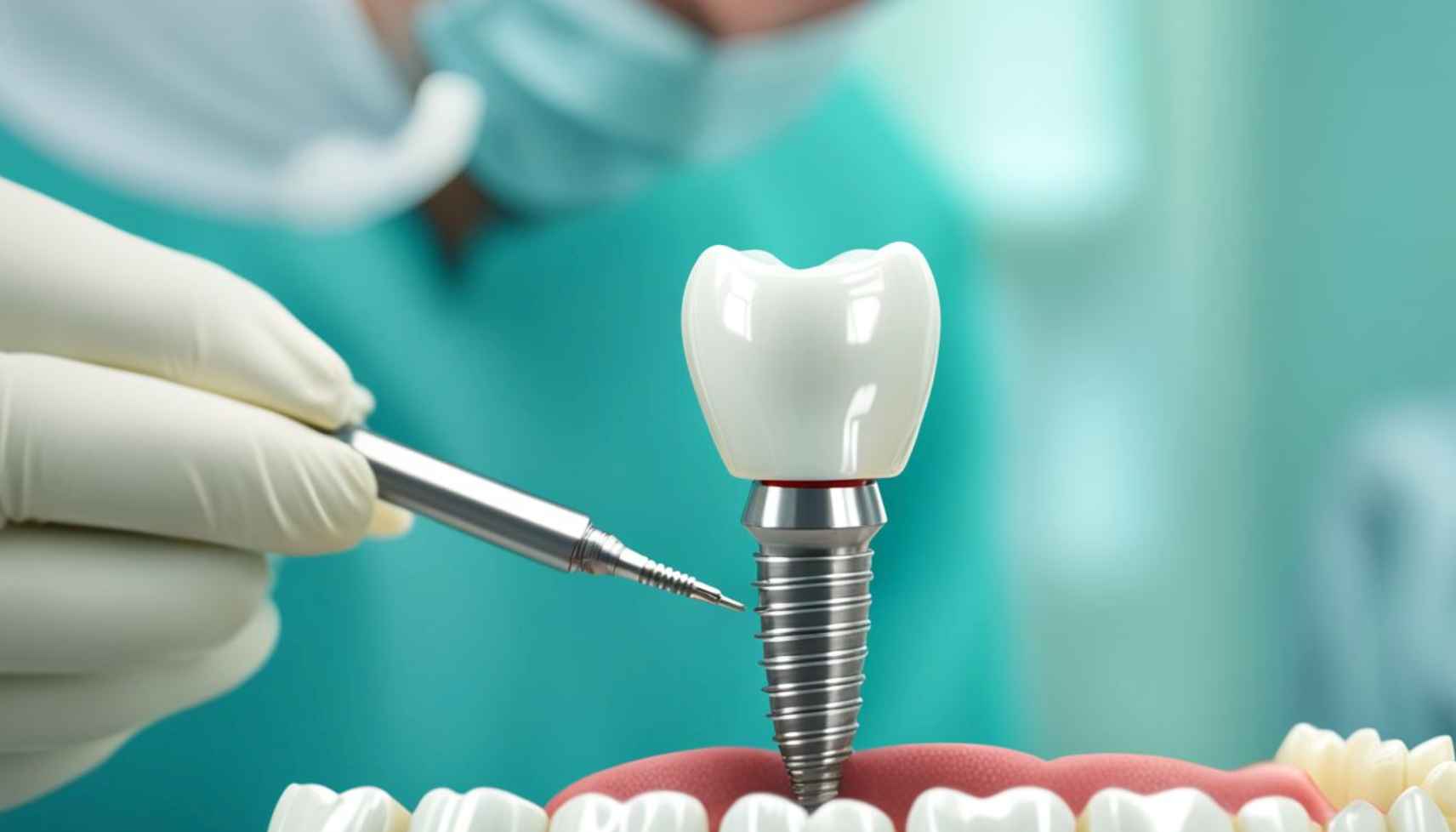Feeling the frustration of missing teeth? An ever-increasing number of Australians are grappling with the impacts of tooth loss. Fortunately, dental implants are a modern solution offering a potentially life-changing remedy.
Picture this: enjoying your favourite foods, flashing a confident smile, and maintaining the best version of your oral health. This all becomes possible with dental implants, an innovative solution for restoring your smile. But just what are these dental implants, and how do they enhance your life? We’ll delve into these questions together.
What Are Dental Implants?
Dental implants are a modern solution for replacing missing teeth. They consist of titanium posts surgically inserted into the jawbone, which act as artificial tooth roots. Once the implant integrates with the bone, a dental crown is attached on top to provide a natural-looking and functional replacement tooth. Implants are durable, and long-lasting, and help preserve jawbone structure, making them a popular choice for restoring smiles and improving oral health.
Types of Dental Implants
Multiple dental implant types exist, each serving unique purposes. Some common options include:
Endosteal Implants
Endosteal implants are the standard choice for dental replacements. They are placed directly into the jawbone. This not only secures but also closely mimics the function of natural tooth roots.
Subperiosteal Implants
Subperiosteal implants rest on the jawbone, under the gums, instead of within it. These implants are ideal for those who have low bone density or height in the jaw. Because they sit above the bone, less bone support is required.
Zygomatic Implants
Alternatively, zygomatic implants attach to the cheekbone, avoiding the jawbone. They are for individuals lacking substantial bone in their upper jaw. This technology overcomes issues posed by significant bone loss.
Benefits of Dental Implants
Dental implants offer numerous benefits for your smile. You can fully enjoy the elevation they give to your quality of life. These prosthetics, appearing and functioning like natural teeth, boost your confidence and restore ease to daily activities and protect your oral health.
Improved Appearance and Functionality
These implants mimic the look and action of real teeth. By filling gaps left by missing teeth, they can improve your grin and reinstate the ability to chew and talk clearly, so you’re no longer missing out on enjoying your favourite foods and laughter with your friends and family.
Enhanced Oral Health and Stability
Implants, unlike bridges or dentures, need little upkeep and or special cleaning, so maintaining your oral health isn’t made more difficult. Implants bond with the jaw, providing you with a firm base that also keeps natural teeth healthy by stimulating the jawbone. They help prevent the sunken appearance in the jaw that often comes from losing several teeth. This aids in your oral stability and overall well-being.
Long-term Durability
Designed for endurance, implants can last a lifetime. They are designed with your day to day life in mind and thus, are resilient against daily chewing stresses, offering a dependable solution for missing teeth. Their durability confirms that they are a lasting and meaningful investment in your dental health.
Preserves Jawbone Health
As mentioned earlier, a lost tooth can degrade the jawbone. Your jawbone health is imperative to take care of. Implants, however, prevent this erosion by regularly stimulating the bone. This maintenance not only sustains facial structure but also guards against tooth misalignment.
Improved Speech
Dental implants help improve speech by eliminating the slippage and discomfort often associated with dentures, allowing you to speak clearly and confidently.
Improved Comfort
Unlike removable dentures, dental implants are inserted directly into your mouth, providing a comfortable and secure fit that feels like natural teeth.No need to worry about discomfort or any slipping or misalignment, you can be assured that your implants are fitted in firmly.
Who Might Need Dental Implants?

Consider dental implants if you’ve been struggling with missing teeth, cavities, or periodontal disease. First, a detailed evaluation by your trusted dentist is needed to confirm if dental implants are suitable for you.
Missing Teeth
Dental implants are a great choice if you’re missing teeth due to various reasons like trauma or decay. Their absence negatively affects both your smile and the health of your remaining teeth. Without intervention, issues like bone loss can arise. Fortunately, dental implants offer a stable, natural-looking solution.
Cavities
If cavities result in significant tooth loss, dental implants could be the next step. Severely damaged teeth may need extraction, paving the way for implants. This approach doesn’t just solve the gap; it also safeguards against future decay.
The Dental Implant Procedure
At our clinic, understand that dental implants might raise concerns. Our skilled team will lead you through it. This method usually includes three main steps. These are the initial consultation, the surgery for placing the implants, and fixing the crown and the abutment at the end.
Initial Consultation
Your dentist will look closely at your oral health during your first meeting. They will also talk about your wants for your tooth replacement. They will check your medical past, take X-rays, and see if you’re fit for implants. Your overall health, oral hygiene, and bone strength play a role in implant success.
Treatment Planning
If implants are a good fit for you, we will plan your treatment together. This might need additional steps like bone grafting or a sinus lift. These help make sure your jawbone is ready to support the implant well.
Implant Placement Surgery
On surgery day, local anesthesia will be provided during the surgery. Over the next few months after the surgery, during the healing process, your bone and the implant will join firmly in osseointegration.
Osseointegration Process
Osseointegration is vital for a stable foundation. It takes 3-6 months as your bone and the implant bond. You may have a temporary fitting during this time.
Abutment and Crown Placement
Next, an abutment connects the implant and the final tooth. Your new tooth, bridge, or denture will be fixed by your dentist. This completes your dental implant journey, giving you a new smile and better teeth functions.
Drawbacks of Dental Implants
Higher Upfront Cost
Dental implants can be a significant financial investment compared to other tooth replacement options like dentures or bridges. The costs include consultations, surgery, and materials, which may be daunting for some patients.
Surgery Required
The implant procedure involves surgery, which can be a barrier for those anxious about dental operations. This process requires a skilled dental surgeon and a sterile environment, adding to the complexity.
Discomfort and Healing Time
Post-surgery, patients may experience discomfort, swelling, and bruising. The healing process, including osseointegration, can take several months, during which careful aftercare is essential to ensure successful integration.
Potential for Complications
As with any surgical procedure, there is a risk of complications such as infection, nerve damage, or implant failure. Thorough evaluation and proper dental hygiene are crucial to minimize these risks.
Requires Jawbone
Dental implants need sufficient jawbone density to anchor securely. Patients with inadequate bone structure may require additional procedures like bone grafting, which can extend the treatment timeline and increase costs.
Dental Implant Aftercare

Immediate Aftercare
After the dental implant procedure, it’s important to avoid disturbing the implant area. Make sure to avoid strenuous activities and follow your dentist’s instructions closely. Additionally, applying ice packs can help reduce swelling, and any prescribed pain medication should be taken as directed to manage discomfort.
Diet
Stick to a soft food diet for the first few days following the surgery to avoid putting pressure on the new implants. Foods like soups, yogurt, mashed potatoes, and smoothies are ideal. Gradually reintroduce harder foods as recommended by your dentist.
Long-term Aftercare
Maintaining good oral hygiene is essential for the longevity of your implants. Brush gently with a soft-bristled toothbrush and floss around the implant site. Regular dental check-ups are crucial to monitor the health of the implants and surrounding tissues. Additionally, avoid smoking and limit alcohol consumption to promote optimal healing and implant stability.
Transform Your Smile with Dental Implants at Angel Dental Care
Angel Dental Care recognises the massive impact dental implants can have on individuals. For those enduring the effects of missing teeth or oral diseases, this solution can turn their world around. Our practice combines state-of-the-art implant procedures with a tailor-made care plan. Together, we can restore your smile, ensuring it’s as natural and beautiful as possible.
Stuck between traditional dentures and not feeling like you? It might be time to consider dental implants. They offer a solution that not only looks real but feels real too. Choosing the correct team and undergoing proper maintenance can give you a smile you’ll openly beam with. To find out how our services align with your needs, give Angel Dental Care a call at (02) 4677 1048. Chat with an experienced dentist, Dr Minal from Angel Dental Care and rediscover your oral well-being while welcoming a future with a beaming, confident smile. Let us guide you on this path to greater overall health and joy.



